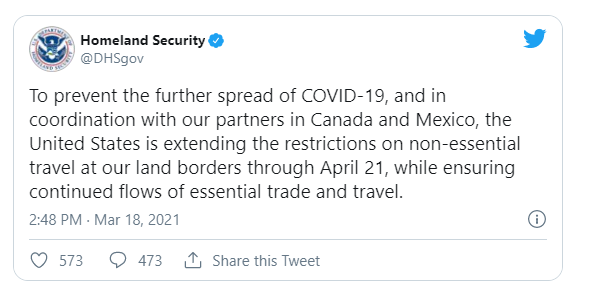"To prevent the further spread of COVID-19, and in coordination with our partners in Canada and Mexico, the United States is extending the restrictions on nonessential travel at our land borders through April 21, while ensuring continued flows of essential trade and travel," the Department of Homeland Security announced via tweet.
Until then, DHS said, "We will work with our counterparts to identify an approach to easing restrictions when conditions permit and with the protection of our citizens from COVID-19 at the forefront of our minds."

Sunday will mark a full year of border closures. DHS and its Canadian and Mexican counterparts enacted the initial closure on March 21, 2020, as the coronavirus pandemic began to spread throughout North America. It has been extended on a month-to-month basis since then.
In the intervening year, Canada has tightened its border security, requiring anyone entering by plane or land to be tested in advance for COVID-19 and banning cruise ships from its waters until February 2022. In addition, anyone traveling to Canada from the U.S. must prove that they are doing so for essential reasons and must quarantine upon arrival.
By contrast, Americans can still fly into Mexico, one of the few nations in Latin America – and the world – to have instituted almost no measures to limit travelers, require mandatory testing or order isolation upon arrival.
Passengers bound for Mexico just have to fill out a form asking about their risk factors for COVID-19 and their contact details.
However, as of Jan. 26, Americans returning from Mexico are required to present a negative COVID test before boarding a flight to the U.S. Resorts in Quintana Roo, the Mexican state that is home to popular tourist destinations like Cancun and Tulum, have responded by providing on-site testing for their departing guests within the 72-hour window required by the U.S. Centers for Disease Control and Prevention
America's improvements with its coronavirus epidemic are stalling, with 23 states now reporting more new cases in the week ending Wednesday than they did a week earlier. The national stall hides dynamics where some states have continued improving and some have worsened.
Dr. Ashish Jha, dean of Brown University's School of Public Health, on Twitter suggested that vaccinations, the spread of coronavirus variants and the relaxing of pandemic restrictions are each having effects. With most high-risk people likely to be able to get vaccinated by next month, time matters. "Every infection that kills someone today is a person who would get vaccinated in the few weeks," he tweeted.
Contributing: Michael Stucka, USA TODAY; Associated Press
SOURCE:
usatoday https://www.usatoday.com/story/travel/news/2021/03/18/us-border-closures-canada-mexico-extended-through-april-21/4751145001/
/fit-in/1024x1024/storage/images/blog/primary/5749896a-54aa-49fe-8fab-081f023cb845-012_USATSI_14201641.jpg)